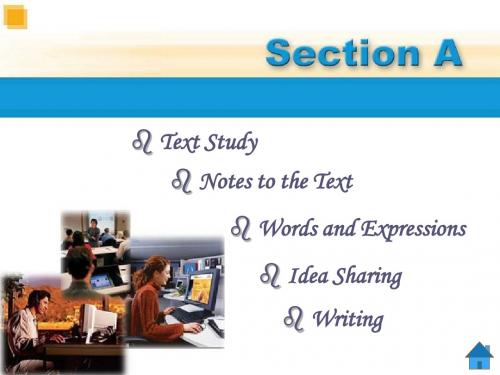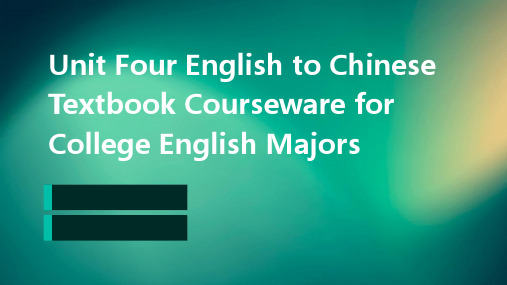Translation Practice for Unit 4 西方文化读本翻译
《西方翻译理论名著选读》 目录

刘军平、覃江华编著的《西方翻译理论名著选读》在皇皇卷帙的西方翻译理论的各种原典中,精选了52篇西方翻译理论家的代表性译论,“弱水三千我只取一瓢饮”,每位翻译理论家撷取的是最具代表性或最有影响的文章或代表作片段。
本书编排内容的时间顺序跨越古代、现代和当代,并按照西方翻译理论的发展特征和不同译论家的理论特色分为九大翻译理论流派,即语文学派、语言学派、功能学派、认知学派、描写学派、文化学派、后殖民及女性主义学派、哲学学派和中西比较诗学派。
全书基本按照这几大流派的思想背景和发展历程进行整理。
目录第一章语文学派圣·奥古斯丁(St.Augustine)/1The Use of Translations/2艾蒂安·多雷(Etienne Dolet)/10The Way to Translate Well from One Language into Another/10约翰·德莱顿(John Dryden)/14The Three Types of Translation/15亚历山大·弗雷泽·泰特勒(Alexander Fraser Tytler)/23The Proper Task of a Translator/24马修·阿诺德(Matthew Arnold)/30The Translator's Tribunal/3 1弗朗西斯·威廉·纽曼(Francis William Newman)/41The Unlearned Public Is the Rightful Judge of Taste/42第二章语言学派罗曼·雅各布逊(Roman Jakobson)/46On Linguistic Aspects of Translation/47约翰·坎尼森·卡特福德(John Cunnison Catford)/54 Translation Shifts/55尤金·阿尔伯特·奈达(Eugene Albert Nida)/63Principles of Correspondence/64彼得·纽马克(Peter Newmark)/81Communicative and Semantic Translation/82奥伯利奇·纽伯特(Albrecht Neubert)/101Translation,Text,Translation Studies/102巴兹尔·哈蒂姆和伊恩·梅森(Basil Hatim&Ian Mason)/130 Pofiteness in Screen Translating/131第三章功能学派卡特琳娜·赖斯(Katharina Reiss)/149Type, Kind and Individuality of Text:Decision-making in Translation/150汉斯·约瑟夫·弗米尔(Hans Josef Vermeer)/163Skopos and Commission in Translational Action/164克里斯蒂安·诺德(Christiane Nord)/178A Functional Typology of Translations/179第四章认知学派厄恩斯特-奥古斯特·格特(Ernst-August Gutt)/202 Translation and Relevance/203罗杰·贝尔(Roger T.Bell)/225Translating,the Model/226丹尼·吉尔(Daniel Gile)/242The Effort Models in Interpretation/243第五章描写学派詹姆斯·斯特拉顿·霍姆斯(James Stratton Holmes)/268The Name and Nature ofTranslation Studies/269伊塔玛·埃文-佐哈尔(Itamar Even-Zohar)/282The Position of Translated Literature within the Literary Polysystem/283吉迪恩·图里(Gideon Toury)/289The Nature and Role of Norms in Translation/290莫娜·贝克(Mona Baker)/306Narratives in and of Translation/307安德鲁·切斯特曼(Andrew Chesterman)/318Memes of Translation/3 19西奥·赫曼斯(Theo Hermans)/332Translation's Other/333第六章文化学派安德烈·勒费弗尔(Andre Lefevere)/353Mother Courage's Cucumbers:Text,System and Refraction in a Theory of Literature/354苏珊·巴斯内特(Susan Bassnett)/375The Translation Turn in Cultural Studies/376劳伦斯·韦努蒂(Lawrence Venuti)/392The Formation of Cultural Identities/393埃德温·根茨勒(Edwin Gentzler)/415Translation,Poststructuralism,and Power/416迈克尔·克罗宁(Michael Cronin)/436History,Translation,Postcolonialism/437霍米·巴巴(Homi Bhabha)/454How Newness Enters the World:Postmodern Space, Postcolonial Times and the ri ftals of Cuhural Translation/455第七章后殖民及女性主义学派加亚特里·查克拉沃蒂·斯皮瓦克(Gayatri Chakravorty Spivak)/482The Politics of Translation/483道格拉斯·罗宾逊(Douglas Robinson)/507Posteolonial Studies, Translation Studies/508玛丽亚·铁木志科(Mafia Tymoczko)/528Translations of Themselves: the Contours of Postcolonial Fiction/529罗莉·张伯伦(Lori Chamberlain)/543Gender and the Metaphorics of Translation/544露易丝·冯·弗洛托(Luise yon Flotow)/562Gender and the Practice of Translation/563雪莉·西蒙(Sherry Simon)/582Taking Gendered Positions in Translation Theory/583第八章哲学学派弗里德里希·施莱尔马赫(Friedrich Schleiermacher)/610On the Different Methods of Translating/611弗里德里希·威廉·尼采(Friedfieh Wilhelm Nietzsche)/635 Translation as Conquest/636瓦尔特·本雅明(Walter Benjamin)/638The Task of the Translator/639雅克·德里达(Jacques Derrida)/649Des Tours de Babel/650威拉德·冯·奥曼·奎因(Willard Van Orman Quine)/682 Meaning and Translation/683汉斯-格奥尔格·伽达默尔(Hans—Georg Gadamer)/704 Language as the Medium of Hermeneutic Experience/705 乔治·斯坦纳(George Steiner)/725The Hermeneutie Motion/726保罗·利科(Paul Ricoeur)/732The Paradigm of TrarMation/733安东尼·皮姆(Anthony Pyrn)/746Translation Studies avd Western Philosophy/747第九章中西比较诗学派刘若愚(James J.Y.Liu)/767The Critic as Translator/768叶维廉(Wai—lim Yip)/781Ezra Pound's Cathay/782欧阳桢(Eugene Chen Eqyang)/807“Aaifices of Eternity”:Audiences for Translations of Chinese Literature/808宇文所安(Stephen Owen)/822A Note on Translation/823厄内斯特·弗朗西斯科·费诺罗萨(Ernest Francisco Fenollosa)/830The Chinese Written Character as a Medium for Poetry/831 马悦然(Gfiran Malmqvist)/851On the R01e of the Translator/852葛浩文(Howard Goldblatt)/862Why I Hate Arthur Waley?Translating Chinese in aPost-Victorian Era/863参考文献。
英语翻译

It is essential that businessmen should win consumers through the quality of their products rather than through the advertisements.
25政府认为国防的重要性在教育之上。(put high value on)
The government outs a higher value on defense than on education.
26新公路的建造由于天气不好而耽搁下来了。(hold up)
The building of the new road has been held up by bad weather.
23分配给我的工作是照料新来的学生。(assign)
I’ve been assigned the job of looking after the new students.
24在像这样的小镇上,当地的教堂在人们的生活上起着重要的作用。(part)
In small towns like this, the local church plays an important part in people lives.
3正如预料中的,全家都被这消息震惊了。(expect)
As expected, the whole family was shocked by the news.
4你不能指望孩子们一直保持安静。(expect)
You can’t expect children to be quite all the time.
新视野大学英语读写教程(第二版)第四册 Unit 10 Section A How to Cultivate EQ

4
10
Text Study—Understanding
imagery
knowledge
intelligent
sense
inflexible
adaptive creative conscious
judgment
perspective
4
10
Text Study—Summary
III. Summary
4
10
Text Study—Understanding
II. Understanding
1. Answer the following questions with no more than 10 words.
4
10
Text Study—Understanding
1) Why is judgment a more valuable contribution than knowledge?
4
10
Text Study—Understanding
3) How can we develop Emotional Intelligence?
Key
To develop four adaptive skills: Raising consciousness; Using imagery; Considering and reconsidering events; Integrating the perspectives of others.
4
10
Text Study—Reproduction
IV. Reproduction
Work in pairs. One student role-plays an expert on EQ education while the other wants to know all about it. Create a dialogue and focus on the following points: 1. The importance of EQ 2. The ways to cultivate EQ 3. The change of one’s “world view”
商务英语翻译 Unit 4

• • • • •
• • • •
(2)拟人 使宣传的产品富于人物的情感和特侦,更人性化。 如:Apple thinks different(苹果电脑,不同凡响)。 (3)仿拟 仿照人们熟知的现成的语言材料,根据表达的需要临时 创造出新的语句,使语言生动活泼。 如:Where there is a way, there is a Toyota (车到山前必有 路,有路必有丰田车),就是模仿耳熟能详的谚语Where there is a will, there is a way(有志者,事竟成)。 (4)双关 为加深语意,利用词的多义和同音,有意使语句具有双 重意义,言在此而意在彼。 如:we lead, others copy(理光打印机广告:我们领先, 他人模仿),copy一语双关,既体现打印机复印的功能, 又表现该品牌的领先地位。
• 参考译文:
• • • • • • • • • •
(1) 没有买卖,就没有杀害 (2) 开车不喝酒,喝酒不开车 (3) 因为绿色属于树木,地球才有了脉搏 (4) 保护环境识每个公民的责任与义务 (5) 使地球充满生机! (6) 胜利是不会向我走来的,我必须自己走向胜利 (7) 授人以鱼,不如授人以渔 (8谨防扒手 (9) 知识是一宝库,而实践就是开启宝库大门的钥匙 (10) 工作时工作, 玩乐是玩乐, 依此方法做, 轻松与欢 乐
• 句法特点(Sentences) • (1)多用简单句 • 广告语言必须简练,能一下子抓住人们的注意 力,引起大家的兴趣。 • 如:Nobody is perfect • Quality first. Customer supreme • (2)常用疑问句、祈使句和省略句 • 广告中采用疑问句和祈使句可激起人们的反应, 使之采取行动。 • Wouldn’t you really rather have a Buick? • to indulge • You decide
英语翻译translation practice

归化和异化
• • • • to kill tow birds with one stone 一石两鸟,一箭双雕,一举两得 归化(domestication)和异化(foreignization) 归化:使翻译文本符合译入语的文化价值和审美 情趣的翻译方法 • 异化:使翻译文本保留源语的语言文化特色的翻 译方法。
Translation Practice
翻译实践
Orientation
Content: • English-Chinese and Chinese-English translation practices • Basic Translation skills and strategies
Bable Tower
Cultrual background
Culture-loaded words: words that reflects cultural information and social life Adam’s apple He respected Tom. He was his man Friday. It is a Greek gift to you. Trojan Horse 随着该法规的出台,出版社有了紧箍咒。 With the regulation issued, publishers are supervised.
Examples of Domestication
• • • • • • • • • • • Wet like a drown rat Seek a hare in a hen’s nest Cry up wine and sell vinegar to paint the lily a heart-shaped face I got an O. Henry ending. Two heads are better than one as poor as a church mouse laugh off one’s head 挥金如土 力大如牛
第四讲课部分课件

I. Translation Theories
grammatical meaning referential meaning connotative meaning
Factors:
speakers style of language habitual association (cultural)
Fine words dress ill deeds.
_______掩饰着罪恶行径。 He deserves not the sweet that will not taste the sour.
不吃______,难得_____。
2) 英文常用省略(结构性增补)
Ignorance is the mother of fear as well as of admiration.
3) 重复宾语(修辞性增补) We have to analyze and solve problems. 我们要分析问题,解决问题。 Let us revise our safety and sanitary regulations. 我们来修改安全规则和卫生规则吧。 4) P112 Task 3 英文中的pronouns在中文中可以处理成它所取代的名词 But we still have defects, and very big ones. 但是我们还是有缺点的,而且还有很大的缺点。 A large family has its difficulties. 大家庭有大家庭的难处。 英译汉时,被定语从句修饰的名词有时需要重复 We have advocated the principle of peaceful coexistence, which is now growing more and more popular among the nations of Asia and Africa. 我们提倡和平共处的原则,这个原则目前在亚非各国越来越得人心了。
大学英语专业英翻中教材课件unitfour

Ensure that the topic has discussion value, can stimulate students' thinking and expression of opinions, and requires accurate language and rich content.
Exhibition and Review of Student Works
01
Work Exhibition
Regularly organize student work exhibitions to showcase excellent compositions and stimulate their writing confidence and sense of honor.
Interactive communication
Encourage students to evaluate and communicate with each other, grow together through interactive learning, and cultivate their critical thinking and evaluation abilities.
The present perfect tense
This unit focuses on the use of the present perfect tense, its formation, and its various uses, such as expressing an action that started in the past and is related to the present
大学体验英语第四册 unit4

Passage A
A Stateless Language that Europe must Embrace
Warm-up Activity
What language do you think acts as the international language? Why? Do you think it reasonable to set English as lingua franca (通用语言) in the European Union?
Experiencing English
Book Four
Unit 4
Language and Economy
Procedure
Lead-in Activities
Discussion Video-watching & Question-Answering
Passage A
Warm-up Activity Cultural Notes Language Points Difficult sentences Summary Follow-up Activity Assignment
Language Points
count: v. be of value or importance
The first trial won’t count.
His opinion counts because of his
experience.
Language Points
set sb/sth apart (from sb/sth): make sb/sth different from or superior to others One day of the week should be set apart for relaxation. The teacher set the fighting boys apart from each other.
- 1、下载文档前请自行甄别文档内容的完整性,平台不提供额外的编辑、内容补充、找答案等附加服务。
- 2、"仅部分预览"的文档,不可在线预览部分如存在完整性等问题,可反馈申请退款(可完整预览的文档不适用该条件!)。
- 3、如文档侵犯您的权益,请联系客服反馈,我们会尽快为您处理(人工客服工作时间:9:00-18:30)。
Translation Practice for Unit 4
Directions: Translate the following passages into English.
1)中国古代教育在中国文化中起着举足轻重的作用。
中国古代教育最早可以追溯到周朝中后期诸子百家的教育思想。
古代中国的教育给人们提供了一个平等的发展机会,即使出身贫寒的人也有可能步入仕途。
春秋时期,伟大的教育家孔子打破“学在官府”的陈规。
私人学堂盛行。
不同的学派通过学堂传播他们的思想主张,出现了百家争鸣的局面。
2)孔子既是教育家又是哲学家。
他的思想理论规范影响着人们的伦理、道德、生活等方方面面。
孔子思想的特征之一是他十分强调教育与学习。
在思与学的关系上,他认为学思并重。
他认为,“学而不思则罔,思而不学则殆。
”对孔子来说,道德教育是最重要的。
